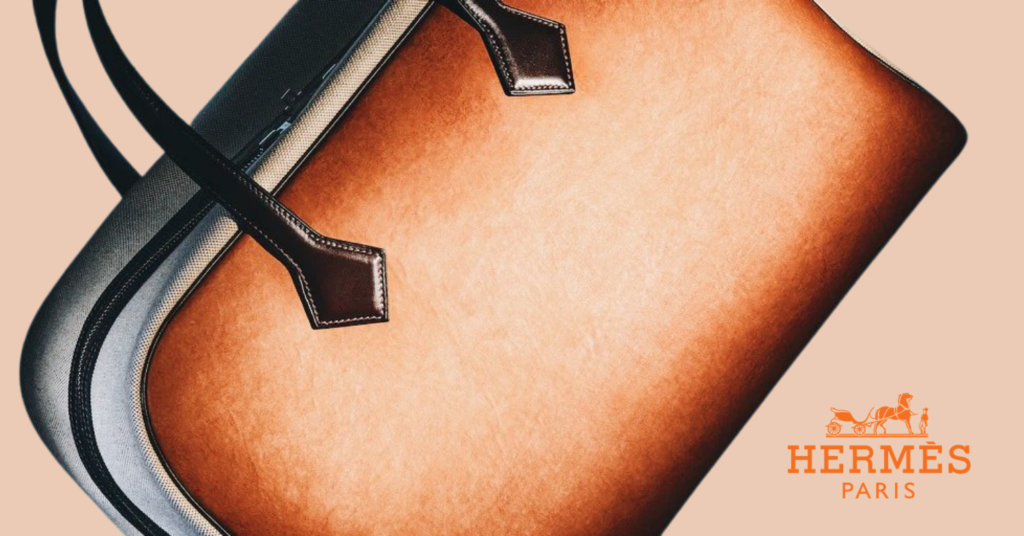An Hermès mushroom leather bag is slated to be available for purchase later this year, marking the first time Hermès will use vegan leather in any of its luxury products. The high-end French label plans to reimagine its popular “Victoria” travel bag using a special lab-grown type of mushroom leather. The bag will include canvas and elements of calfskin.
The vegan leather, known as Sylvania, is an amber-hued material that Hermès developed in partnership with California-based start-up, MycoWorks. According to The Business of Fashion, MycoWorks has created a patented process to turn mycelium—a network of threads from the root structure of mushrooms—into a material that imitates the properties of conventional leather.
The inclusion of calfskin means that this new take on the “Victoria” bag isn’t entirely vegan. But, this upcoming product seemingly signifies a shift in the way Hermès is approaching its own luxury goods.
However, the Paris-based company still plans to produce its original version of the “Victoria” bag without any mushroom leather. It will continue to use non-vegan leather in a myriad of products, such as other handbags, belts, and watch straps. Additionally, Hermès will continue to sell items made with alligator and crocodile skin.
Still, Hermès’ decision to use mushroom leather in one of its most well-known products is big. The luxe label reportedly spent about three years developing a plant-based leather that meets its exceptionally high standards.

How Is Hermès Vegan Leather Crafted?
Traditional leather typically comes from animal rawhide (often cattle) and skins. Crafting it is often a resource-intensive process that involves vast amounts of water, land, and energy to rear cows. The hide is treated and dyed with potentially hazardous chemicals.
Sylvania, on the other hand, is completely plant-based and is grown in a lab. The cultivation process actually uses fungi’s capacity to bind to itself and other materials. This is part of what makes mushrooms such a viable leather substitute.
MycoWorks produces Fine Mycelium, the genesis of Sylvania, at its California facility. Skilled tanners then tan and finish the Hermès vegan leather in France. This further refines its strength and durability.
“MycoWorks’ vision and values echo those of Hermès: a strong fascination with natural raw material and its transformation, a quest for excellence, with the aim of ensuring that objects are put to their best use and that their longevity is maximised,” Hermès artistic director, Pierre-Alexis Dumas, said in a statement. “With Sylvania, Hermès is at the heart of what it has always been: innovation in the making.”
MycoWorks CEO Matt Scullin added: “Sylvania represents how nature and biotechnology can work in concert to create a material with the highest standards of quality.”
Luxury Brands Shift to More Sustainable Practices
Hermès’ reimagined “Victoria” bag is just the latest example of how luxury fashion brands are employing more sustainable practices.
For example, in December 2018 Chanel announced that it would cease using fur and exotic animal skins as fashion textiles.
At the time, Chanel president Bruno Pavlovsky said the brand decided to stop using those materials because it’s “becoming increasingly difficult to source skins that met its quality and ethical standards.”
Pavlovsky also noted that Chanel would shift its focus to “textiles and leathers generated by ‘agri-food’ industries.”
Gucci made a similar decision in October 2017 when it revealed that it would be fur-free by Spring 2018, and Burberry committed to ditching fur from all future collections in September 2018.
The Vegan Leather Boom
As far as vegan leather is concerned, other fashion houses have already beat Hermès to the punch. More specifically, Hermès isn’t even the first high-end fashion label to partner with mycelium leather producers.
In October 2020, Bolt Threads brought together several fashion brands to create a consortium that would explore the company’s use of its mushroom-based leather substitute in products.
High-end labels that signed on to participate include Stella McCartney, Kering (the fashion house behind brands like Balenciaga, Gucci, Alexander McQueen, and Bottega Veneta), Lululemon, and Adidas.
“I have always been convinced that innovation is key to addressing the sustainability challenge that luxury is facing. Finding innovative, alternative materials and fabrics can potentially drastically reduce the environmental impact of our industry over the long term,” François-Henri Pinault, the chairman and chief executive of Kering, said in a statement at the time.
The group plans to roll out products incorporating the vegan material, Mylo, later this year.


